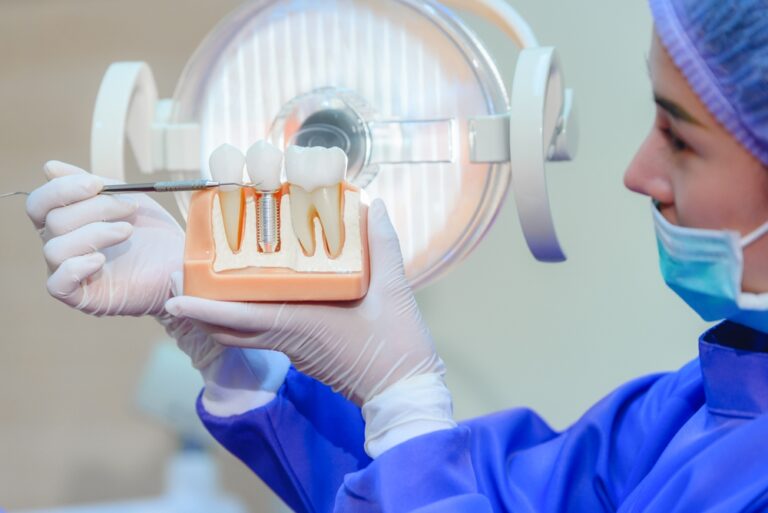What is a Dental Nurse?
A dental nurse is a crucial member of the dental healthcare team. They play an important role in supporting dentists and other dental professionals in providing effective oral care.
Also known as dental assistants in some regions, dental nurses work in dental clinics, hospitals, and other healthcare settings. Their primary responsibility is to assist dentists during various dental procedures and ensure the smooth operation of the dental practice.
Enquire about dental nursing courses
What Do Dental Nurses Do?
Dental nurse roles generally combine clinical practice with administrative work. With these responsibilities, dental nurses contribute significantly to the success of dental practices and improve patient experiences.
- 1. Clinical Responsibilities:
-
-
- Assist dentists during various procedures.
- Prepare treatment rooms for dental examinations and surgeries.
- Organize, sterilize, and arrange dental instruments.
- Take X-rays and impressions as part of the diagnostic process.
- Maintain clear communication between dentists and patients during procedures.
- Provide chairside support, explaining procedures and offering post-treatment care instructions.
- Create a comfortable and reassuring environment for patients.
-
- 2. Administrative Tasks:
-
-
- Manage appointment schedules for efficient patient flow.
- Maintain and update patient records accurately.
- Oversee the inventory of dental supplies to ensure an adequate stock.
- Contribute to the overall smooth operation of the dental practice.
-
- 3. Patient-Focused Responsibilities:
-
-
- Address patient concerns and questions, reducing anxiety associated with dental visits.
- Foster a positive and comfortable environment for patients.
- Educate patients on oral hygiene practices to promote long-term oral health.
-
- 4. Infection Control Measures:
-
-
- Implement and oversee strict infection control measures.
- Ensure the sterilization of instruments to maintain a hygienic dental environment.
- Contribute to maintaining a clean and safe workspace for both patients and dental professionals.
-
- 5. Training and Education:
-
- Typically undergo specialized training programs covering dental anatomy, infection control, and patient management.
- Blend technical skills, interpersonal abilities, and organizational acumen in their daily roles.
Is a Dental Nurse a Good Job?
Becoming a dental nurse can be a highly rewarding and fulfilling career choice for many individuals. A few different factors contribute to making dental nursing a good job:
01. Job Stability and Demand.
Dental healthcare is an essential service, and the demand for dental nurses remains relatively stable. As long as people require oral care, there will be a need for dental professionals, including dental nurses.
02. Varied Responsibilities.
Dental nursing involves a diverse range of responsibilities, combining clinical tasks with administrative duties. This variety keeps the job interesting and provides opportunities for continuous learning and skill development. From assisting in dental procedures to managing patient records, dental nurses engage in tasks that keep their work dynamic and engaging.
03. Positive Impact on Patient Health.
Dental nurses’ supportive role during dental procedures, coupled with patient education on oral hygiene, helps individuals achieve better dental health. Making a positive impact on patients’ well-being can be professionally satisfying.
04. Team Collaboration.
Dental nurses work closely with dentists, dental hygienists, and other healthcare professionals. The collaborative nature of the dental team fosters a supportive work environment.
05. Opportunities for Advancement.
With experience and additional training, dental nurses can specialize in areas such as dental radiography, orthodontics, or dental sedation nursing, to advance their careers further.
06. Continuous Professional Development.
The dental field is dynamic, with ongoing advancements in technology and techniques. Dental nurses have the opportunity for continuous professional development, attending workshops, seminars, and training programs to stay updated with the latest practices in dental healthcare.

While every job has its challenges, the overall consensus is that being a dental nurse can be a good job for those who value job stability, diverse responsibilities, positive patient impact, and opportunities for professional growth within the dental healthcare sector.
Enquire about dental nursing courses
What Skills Do I Need To Become a Dental Nurse?
Becoming a dental nurse requires a diverse set of skills to succeed in the role. Here are key skills essential for those aspiring to become successful dental nurses:
Communication Skills.
- Dental nurses must have strong communication skills to interact with both patients and other members of the dental team. Clear and effective communication is crucial for explaining procedures to patients, addressing concerns, and collaborating with colleagues.
Empathy and Compassion.
- Being empathetic and compassionate is vital in easing patients’ anxieties and creating a comfortable environment. Dental nurses often work with individuals who may be nervous or fearful, and a compassionate approach contributes to a positive patient experience.
Attention to Detail.
- Precision and attention to detail are critical in dental nursing. Whether preparing instruments for a procedure or maintaining patient records, accuracy ensures the smooth flow of operations within the dental practice.
Organisational Skills.
- Dental nurses juggle multiple tasks, from managing appointments to handling administrative responsibilities. Strong organizational skills help in maintaining an efficient and well-organized workplace.
Adaptability.
- The dental environment can be dynamic, and situations may change quickly. Being adaptable allows dental nurses to handle unexpected challenges, adjusting to different procedures, and responding effectively to the evolving needs of the dental practice.
Teamwork.
- Dental nurses work closely with dentists, dental hygienists, and administrative staff. A collaborative and team-oriented approach is essential for dental nurses to have.
Continuous Learning.
- The field of dentistry is constantly changing, with advancements in technology and techniques. A commitment to continuous learning and staying updated on industry trends is a strong skill for a successful career.

Enquire about dental nursing courses
How to Become a Dental Nurse
If you are interested in finding out if dental nursing is the career for you, the best place to start would be an Introduction to Dental Nursing course, with an average cost of £130.
If you are keen to get started on your career, you should complete the Dental Nurse NEBDN-approved national diploma. This is a flexible course that gives you full accreditation to practise as a dental nurse.
Additionally, should you want to progress your career further, you have the option to do several other courses, which will give you the opportunity to increase your salary.
Here are some popular professional development course options, but note that this is a non-conclusive list:
- Basic life support– £50
- Dental impressions taking– £150
- Fluoride varnish applications– £80
- Dental radiography– £500
- Oral Health– £500
- Dental implant nursing– £500
- Dental sedation nursing– £595

